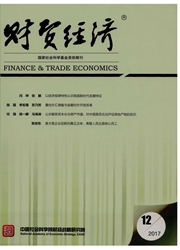

 中文摘要:
中文摘要:
中国企业普遍存在寿命短的问题,尤其随着中国经济增长“减速换挡”时代到来,由“创业浪潮”引爆的大量初创企业该如何存活并茁壮成长,是中国经济保持良好发展潜力的重要议题。因此,本文以信任为切入点,利用2007年、2008年和2009年初创期企业的截面数据,对比分析随寿中国经济环境演变,信任对降低初创期企业规模扩张的市场退出风险的影响,并通过作用机制检验对其进行解释。研究发现:经济环境良好时,初创期企业规模扩张降低了市场退出风险,随着经济环境恶化,初创期企业规模扩张的市场退出风险也在提高,但信任能够起到缓解作用;缓解融资约束机制在经济环境良好时可以解释信任降低初创期企业规模扩张的市场退出风险,经济环境恶化时,高信任度地区的高劳动生产率企业却因缓解融资约束机制无法发挥作用而存在更高的市场退出风险;降低交易成本机制不成立;提升创新效率机制在经济环境恶化时可以解释信任降低初创期企业规模扩张的市场退出风险。
 英文摘要:
英文摘要:
Short enterprise life is common in China. Especially in China's economic "New Normal" era, a large number of start-ups are created in the wave of entrepreneurship. How to keep them survive and thrive is an important issue in China. Using cross section data in 2007, 2008 and 2009, this paper takes trust as a focal point, comparatively analyzes influence of trust on reducing start-ups' exiting risk of scale expansion in different economic environment, and makes explanations with mechanism test. The results show that start-ups' scale expansion has reduced exit risk in good economic conditions; exit risk has increased along with deteriorated economic environment, but trust could relive the risk. Easing financing constraint mechanism can explain how trust relives start-ups' exit risk of scale expansion in good economic conditions, but as economic environment deteriorates, start-ups with high productivity in regions of high trust are in higher exit risk due to easing financing constraint mechanism's invalidation. The mechanism of reducing transaction costs does not work. Promoting innovation efficiency mechanism can explain how trust relives start-ups' exit risk of scale expansion in bad economic conditions.
 同期刊论文项目
同期刊论文项目
 同项目期刊论文
同项目期刊论文
 期刊信息
期刊信息
